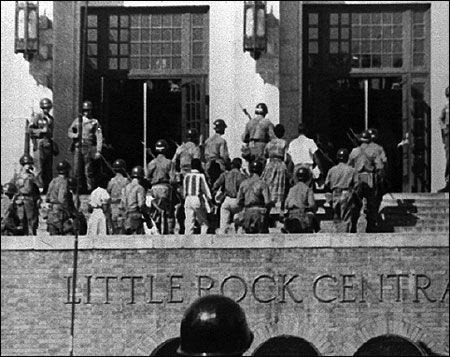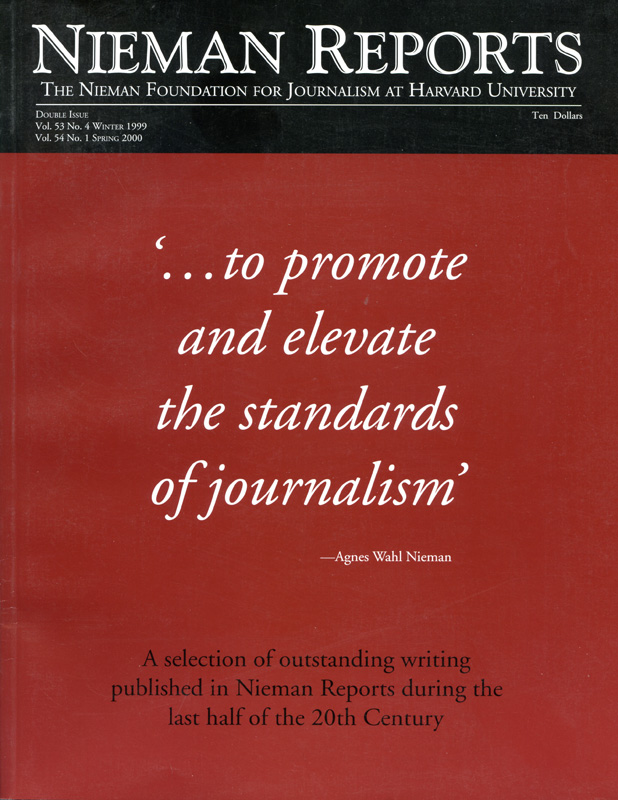
Troops escort nine black students into Central High School in Little Rock, Arkansas, in September 1957. Associated Press Photo, courtesy of The Associated Press.
[This article originally appeared in the April 1948 issue of Nieman Reports.]
There are valid objections to every one of the specific proposals the President has endorsed—constitutional objections, objections in principle, above all practical objections. The Gazette, as an exponent of gradualism, has opposed them and will continue to do so. Yet there is a great danger that the central point at issue will be obscured by legalisms and by the natural resentment inevitably aroused by the threat of federal action.
We can claim great relative progress in the South. Yet we must also recognize that there are still great flaws in the relationship between the races, flaws which do not touch upon the question of social segregation, but upon simple justice. Laying aside all questions of politics and of method, we may properly consider the proposals of the President as a bill of indictment and measure our performance against it.
FEPC [Fair Employment Practices Commission], according to its proponents, represents an effort to obtain economic justice for the Negro. Can we answer that the Negro is being granted an increasingly important place in the economy of the South? We cannot. In all honesty we must admit that, with a few exceptions, he is still denied employment except in the menial and the least rewarding fields of endeavor. And we must further concede that our denial is arbitrary, based not on demonstrated incapacity, but on prejudice.
The anti-lynching proposal embodies a charge that the Negro is denied full justice in Southern courts. As to lynching itself we can point to the record, the steady reduction in the frequency of the crime and the corresponding increase in the responsibility of local law enforcement officials. But what of those lesser “lynchings,” those cases in which the Negro is subjected to “white man’s justice” and denied the fair and impartial hearing that is his right? Can we say, in good conscience, that our courts, and our juries, make no distinction when a Negro faces a white man in a civil or criminal trial?
The poll tax bill implies that the Negro is being denied his proper place in Southern politics. Here again we can point to the record, which shows a steadily increasing Negro participation in elections in most Southern states. But can we truthfully argue that the selective standards we apply to the Negro apply with equal force to the whites? Are we, in fact, rendering that “protection and assistance” Ben Hill called for in the Negro’s “free and unrestricted” enjoyment of his franchise?
Our failures in the field of education are being made increasingly clear by the controversy engendered by recent Supreme Court decisions. The contrast between white and Negro educational facilities reflects no credit upon the South and has seriously weakened our defense of segregation. The willingness of most Southern whites to give the Negro a fair share of our limited public funds is genuine, but it has not been matched by performance. We do not need to look far for an illustration. For more than 15 years the city of Little Rock has amicably discussed the establishment of a Negro park; Little Rock still has no Negro park.
The problems inherent in the relationship between the races in the South are enormously difficult, and Southerners are on solid ground when they argue that they are fully appreciated only by those who have lived with them from birth. They will not yield to revolutionary legislation, whether the intent behind it be destructive or humanitarian. It is therefore inevitable and proper that the South should fight the program outlined by President Truman and accepted, in principle at least, by the Republican Party.
Yet it must be recognized that the South’s choice of weapons is limited. Political secession, as proposed by some of the more excitable Southern politicians, leads nowhere. This is a plan conceived in anger and blind reaction which would ultimately defeat its own purpose. The South today can no more stand alone as a political entity than it could in John C. Calhoun’s time. The effort to break the political ties that bind us to the national political system can only result in the loss of our voice in national affairs.
There is still time, however, for the South to give an affirmative answer to its critics. We can do this by substituting intelligent, concerted action for the lip service we have too frequently given our own ideals of fair treatment for the Negro race. We can accept, without reservation, the special responsibility that falls upon the dominant race and discharge it in good faith—giving the Negro educational, economic and political opportunities not because we are forced to but because we recognize his right to them.…
Above all we must rid ourselves of the delusion that we are the victims of some monstrous plot conceived and executed by hostile “outsiders.” The pressures now being exerted against our institutions are the product of history. They cannot be removed by a single political victory, or even a series of political victories. But they can be materially reduced by a sincere demonstration that the Southern concept of gradualism envisions steady, orderly process for the Negro race, not a blind devotion to the racial status quo.
The solution to our dilemma lies in our own tradition. It is not easy. It calls now, as it did in 1865, for courage, complete devotion to our highest ideals, and self-sacrifice. But until we turn to it we will continue to be vulnerable to every zealot and every political opportunist—inside the South as well as out of it—who would use our weakness for his own ends.
Arkansas Gazette, February 5. Harry S. Ashmore, Editor of the Arkansas Gazette, is a 1942 Nieman Fellow.



